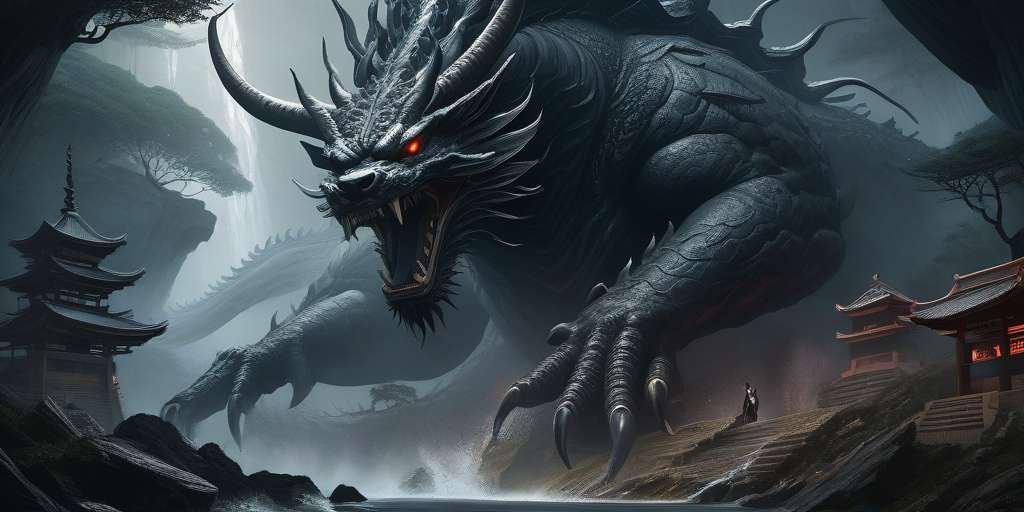Japanese Mythology

Japanese mythology is a rich collection of legends and myths that tell the story of gods and divine beings.
Among the most famous stories is the one that answers the question: Who created Japan?
The answer is Izanagi and Izanami.
Also prominent are deities such as Amaterasu, the sun goddess, Susanoo, the sea god, and Tsukuyomi, the moon god.
In addition, Japanese mythology includes mythical creatures such as the oni, kappa and kitsune, as well as the significant presence of kami, natural spirits.
In this article, we will explore these fascinating aspects of Japanese mythology.
Japanese legends
Japanese mythology is replete with fascinating legends that have been passed down from generation to generation.
These mythical stories transport us to a world full of gods, magical creatures and momentous events that shaped the history and culture of Japan.
History of Izanagi and Izanami
One of the most prominent legends of Japanese mythology is the story of Izanagi and Izanami, the creator gods of the Japanese archipelago.
According to the myth, Izanagi and Izanami descended from the sky and, through a long ritual, created the islands of Japan.
This divine act laid the foundation for the geography and landscape of this beautiful country.
The myth of Kagutsuchi, the god of fire
In Japanese mythology, Kagutsuchi is considered the god of fire and destruction.
According to legend, his birth was extremely traumatic and caused the death of his mother, Izanami.
The tragedy resulting from his birth marked a turning point in the world of gods and left a deep impression on Japanese culture and beliefs.
Tragedy in the underworld and the separation of the gods
Izanagi’s encounter with Izanami in the underworld, known as Yomi, had disastrous consequences.
Izanami died giving birth to Kagutsuchi and her disfigured and maggot-covered appearance terrified Izanagi.
Horrified, he was forced to flee and seal the entrance to the underworld.
This tragedy marked the beginning of the separation between the gods and the establishment of the realms of the living and the dead.
Gods of Death in Japanese Mythology
Japanese mythology is replete with fascinating deities that represent various aspects of life and death.
In this section, we will explore three of these gods of death that occupy a prominent place in Japanese legends and beliefs.
Amaterasu, the goddess of the sun
Amaterasu is one of the main deities of the Japanese pantheon and is known as the goddess of the sun.
According to legend, Amaterasu is the sister of Susanoo and Tsukuyomi, and plays a vital role in balancing the world.
She is credited with the power to give life and light to the universe, but also has the power to take life if she is angry or saddened.
Amaterasu is revered as a benevolent goddess and is worshipped at many shrines throughout Japan.
Belief in her power and protection has been an integral part of Japanese culture and spirituality throughout the centuries.
Susanoo, the god of the sea
Susanoo is one of the most intriguing and complex gods in Japanese mythology.
He is known as the god of the sea and the storm, and is credited with control over the natural elements.
Susanoo is famous for his impulsive actions and volatile nature, often leading to unexpected consequences.
In the stories, Susanoo faces various challenges and enemies, but also plays an important role in protecting and balancing the world.
His influence extends beyond the sea, and he is also associated with fertility and agriculture, highlighting the complexity of his divine character.
Tsukuyomi, the god of the moon
This is a central deity in Japanese mythology and personifies the moon.
Unlike Amaterasu and Susanoo, Tsukuyomi is a more reserved and melancholic figure.
It is attributed to him the control over the night and the luminosity of the moon during the different phases.
In Japanese stories and legends, Tsukuyomi is often associated with the tranquility and mystery of the night.
He is worshipped as a protective god and guardian of souls, as well as a poetic symbol of beauty and balance in nature.
In a nutshell
- Amaterasu is revered as the sun goddess and is credited with the power to give life and light to the universe.
- Susanoo is the god of the sea and the storm, with an unpredictable temperament and an important role in protecting and balancing the world.
- Tsukuyomi personifies the moon and is associated with the tranquility and mystery of the night, as well as the protection of souls.
Japanese myths
Japanese mythology is replete with exciting tales of the kami and mythical creatures that populate Japanese folklore.
These myths reflect the deep spiritual connection of the Japanese to nature and their fascination with supernatural beings.
Below, we will explore some of the highlights of Japanese myths.
Kami, natural spirits in Japanese mythology
Kami are divinities revered in the Shinto religion and play a central role in Japanese mythology.
These spirits are considered guardians of nature, from trees and mountains to rivers and sacred animals.
Each region of Japan has its own local kami, and they are worshipped at Shinto shrines.
Some of the best known kami are Amaterasu, the sun goddess, Susanoo, the sea god, and Tsukuyomi, the moon god.
Mythical creatures such as the oni, kappa and kitsune
Japanese folklore is full of fascinating mythical creatures that have captured the imagination of generations.
The oni are powerful and terrifying demons with horns and fangs, representing evil and destruction.
On the other hand, the kappa are turtle-like aquatic creatures that inhabit rivers and lakes, known for their ingenuity and weakness for cucumbers.
Legends also speak of kitsune, magical foxes capable of shape-shifting and often associated with wisdom and deception.
These creatures are considered messengers of the kami and are attributed with supernatural powers.
The role of dragons in Japanese mythology
In Japanese mythology, dragons occupy a prominent place as divine beings and symbols of power and wisdom.
Unlike their representation in other cultures, Japanese dragons are benevolent beings and are considered protectors of humankind.
They are believed to reside in wells and springs, control natural forces and are allies of the kami.
Japanese myths immerse us in a world full of wonders and extraordinary beings.
These ancestral tales reveal the essence of Japanese culture and its close relationship with the natural world and the supernatural.
Susanoo: The Mighty God of the Sea and Battles
Susanoo, the god of the sea and battles in Japanese Shinto, is known for his complex relationship with his divine brothers Amaterasu and Tsukuyomi. His confrontations with the serpent Yamata-no-Orochi and his subsequent banishment to the earthly world stand out....
Nihon Shoki, history and mythology of Japan uncovered
The Nihon Shoki, also known as Nihongi, is an ancient book that narrates the history and mythology of Japan. It was completed in 720 and its pages contain accounts of Japanese gods, genealogies of emperors and historical facts.Although it has been the subject of...
Yokai: Mysterious Creatures of Japanese Mythology
Yokai are mysterious and supernatural creatures that are part of Japanese folklore. These creatures, with supernatural abilities and varied appearance, inhabit the border between the real and divine worlds. Although their relationship with humans is complex and...
Jorogumo: The Mysterious Harpy of Japanese Mythology
Jorogumo is an intriguing creature from Japanese mythology. According to legend, she is a spider woman who has the ability to transform herself. This magical being possesses supernatural powers and seduces her victims with her charm. In the article, we will explore...
Subscribe
If you want to receive in your mailbox stories, curiosities and legends of the most fascinating creatures of classical mythology just fill in this form.

Classical Mythology
mitologiaclasica.com is a website dedicated to explore and spread the fascinating richness of mythology, offering a vast compendium of stories, characters and legends.
Madrid, 2023
info@mitologiaclasica.com
Explore
Greek Mythology
Roman Mythology
Norse Mythology
Egyptian Mythology
Hindu Mythology
Chinese Mythology
Japanese Mythology
Celtic Mythology
Privacy Policy
Privacy Policy
Copyright mitologiaclasica.com



